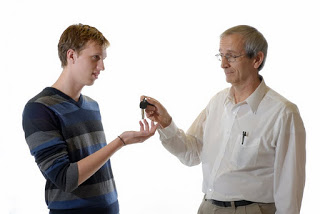
Exercising Parental Control Can Lead to Fewer Teen Driving Crashes
September 22, 2006
Sometimes it can be tough being a teenager. You have all these expectations heaped on you – get good grades, be responsible, mind your parents… But what if your parents are not exercising any control over your behavior? Results from the latest Teens Today study show that driving accidents are way down in the teenage category as compared to twenty-five years ago. That sounds great on the surface but the reality of it is that those teenagers who are causing the crashes are not being governed adequately by their parents.
These crash-causing teens are practicing reckless behavior like driving while drunk or under the influence of drugs. Others are being just plain careless by not practicing safe driving conduct. Ask any teenager who drives and acts responsibly why they have not been in an accident. The answer is their parents impose consequences for their negative actions and behavior. It is as simple as that! They screw up whether it is a scratch on the bumper or a speeding ticket and chances are that the parents will take their car keys away for a period of time. What better way for us to learn than by cutting off our source of independence!
We all grumble about our parents from time to time. But let’s face it – some of them just aren’t as involved in our lives as they should be. We all have heard that old saying about kids wanting discipline. Well, in this case, while teenagers may not say they want it, they need it to stay on the straight and narrow. Parents – we should not have to learn the hard way about drinking and driving or bad driving practices like sending text messages or eating while driving.
Teenagers should be learning by the example their parents set. What’s even worse about this whole thing is that sometimes, parents are in the car when their kids are displaying that bad behavior like speeding, talking on the cell phone or fiddling with the CD player. The parents should make their kid pull over because they were not practicing safe driving behavior. Instead, many of them just let it go, teaching those teenagers that it is ok to continue those destructive behaviors.
Come on bad teenage drivers! You are giving the rest of us a bad name. Clean up your act and treat driving a car like the privilege that it is. And that is exactly what driving should be to a teenager – a privilege. Listen up parents! Be the grownup and take away the car keys if you have to … it is definitely better to have a mad teenager than a dead one.
Parents and Teens Both Get into the Safe Driving Groove
September 11, 2006
It is every teen’s dream to get that learner’s permit in their hand. After all, driving equates to freedom, doesn’t it? But let’s face it teenagers, we don’t know everything there is to know about driving a car. Did you know that car crashes are the leading cause of death in our age bracket? That’s a pretty scary thought!
The recent article in the Cincinnati Post about teen drivers is sort of eye-opening. Sure, we know to buckle our seat belts and make sure to use our turn signals and such. But who is going to really teach us about what to do if our brakes lock or how to get out of a dangerous skid? That is not exactly something our parents could or know how to teach us.
Yeah, they preach to us about safety on the road and tell us in theory how to get out of a dangerous driving situation, but until we actually experience it, all that talk is in one ear and out the other right? We humor the parents and we lead ourselves into a false sense of security. We think that those crashes will never happen to us. But the reality of it all is that we COULD be that next crash just waiting to happen.
Car manufacturer Toyota came up with a great driving awareness program called “Toyota Driving Expectations.” The catch is that we teenagers have to take the class with our parents! Now before all the grumbling starts, this class is quite an eye-opener for both us and the “adults.” They get put through their paces just as much as we do.
Each of us gets to experience our own driving courses; parents have different distractions thrown at them like ringing cell phones and fiddling with the radio, things we all do every day. Teenagers get to learn some defensive maneuvers and how to avoid crashes. Believe it or not, it’s interesting and fun to experience this stuff with your parents. We all learn something and have a better respect for each other’s driving abilities. And guess what? Parents will feel a little more secure and willing to let you drive!
Be sure to talk with them about the “Toyota Driving Expectations” program and visit the website at Toyota Teen Drive 365 to see if there is a class near you.
According to new scientific studies, the area of the brain that controls impulsive behavior doesn’t reach maturity until the age of 25. This has caused many people to reconsider the age that teens should be allowed to drive. Currently, many states allow teens as young as 16 the right to drive. However, statistics have proved that 16 year olds are dangerous drivers, have the highest auto related death rates, and more teens die while riding in vehicles driven by 16 year olds. What is interesting is that even though many parents and politicians feel that 16 is too young to drive, there is a certain degree of hesitancy when it comes to changing existing laws.
Some people look to the fact that many parents are tired of chaperoning their teens and look forward to the day when they can manage some of the responsibility of transportation themselves. But, ask any parent who has lost a child in a teen related auto crash, and they will quickly tell you that they would gladly chauffer their teen if it meant having their child back in their lives again.
Nearly all states have implemented changes that affect the way teens drive. Some of these changes include limiting the amount of passengers teens may have in the vehicle or decreasing the amount of time teens can drive alone. Nevertheless, though these rules have been put in place to help keep teens safe, they are frequently not enforced.
There is often a misconception behind the reasons why teens are involved in so many fatal crashes. The fatal crashes are often mistakenly blamed on alcohol or drugs. However, as current studies have shown, it is a matter of brain maturity, and not excessive teen drinking that contributes to the high rate of deaths associated with teen drivers.
When people put pressure on politicians to raise the drinking age, changes were made that ensured the drinking age would be 21. This has been a positive change that has undoubtedly saved many lives. Unfortunately, it seems that it may take more fatal crashes before politicians realize that the best way to protect teens from the dangers of driving is to similarly raise the driving age.
Read more driver education news in the Safe Driving Teen Monthly Bulletin. Each month the National Safety Commission publishes the bulletin for teens and parents designed to improve teen driver behavior, attitude, skills, and experience. Subscription Details
Keep Teens Driving on the Straight and Narrow
September 6, 2006
Having clear-cut rules about the family car and/or driving privileges in general seems like a smart plan for teenagers. After all, most of our parents just tell us to be careful and then impose restrictions after the fact for some indiscretion. Having to guess what the family rules are sometimes can be compared to a weather report – partly cloudy.
There is this recent news story about parents setting rules before we get into the car. Well, of course, we would love to be free to do what we want, but at least if we knew the rules in advance, we could not grumble about not knowing that we did something wrong! And parents – be consistent with us teenagers ok? We’re confused enough as it is without the parental unit changing their minds.
Some parents really think about our driving and come up with a lot of do’s and don’ts for us while others sort of make it up as they go along. Parents take the advice of this teenager – we will push every limit possible when it comes to our driving privileges so you better really, really think about the rules you want to set!
Here are some of the most common rules that we teenagers are familiar with: obeying speed limits, not having more passengers in the car than allowed, and no drinking. However, there are a few things that we are going to do unless you tell us or catch us doing them. We are likely going to use our cell phones and drive at the same time. The same goes for eating or drinking a soda. We have also been known to change the radio station with one hand or text message a friend behind the wheel of a car. Many times, parents do not think of these things and these are what can get us in trouble.
Now other teenagers are probably yelling at me for telling all our secrets, but come on! Why get in trouble for those same things later when we can avoid doing them now. Besides, no matter how much the parental unit may rain on our parades, they mean well and only want the best for us. Add the fatality record of teenager drivers and the parents can definitely back up their case. Why don’t we give them a break for a change and actually follow the rules – well, these rules anyway.
This post is an excerpt from a recent edition of the Safe Driving Teen Monthly Bulletin. Each month the National Safety Commission publishes the bulletin for teens and parents designed to improve teen driver behavior, attitude, skills, and experience. Subscription Details

Will 16 Year Olds Lose Their Driving Privileges?
September 1, 2006
According to new scientific studies, the area of the brain that controls impulsive behavior doesn’t reach maturity until the age of 25. This has caused many people to reconsider the age that teens should be allowed to drive. Currently, many states allow teens as young as 16 the right to drive. However, statistics have proved that 16 year olds are dangerous drivers, have the highest auto related death rates, and more teens die while riding in vehicles driven by 16 year olds. What is interesting is that even though many parents and politicians feel that 16 is too young to drive, there is a certain degree of hesitancy when it comes to changing existing laws.
Some people look to the fact that many parents are tired of chaperoning their teens and look forward to the day when they can manage some of the responsibility of transportation themselves. But, ask any parent who has lost a child in a teen related auto accident, and they will quickly tell you that they would gladly chauffer their teen if it meant having their child back in their lives again.
Nearly all states have implemented changes that affect the way teens drive. Some of these changes include limiting the amount of passengers teens may have in the vehicle or decreasing the amount of time teens can drive alone. Nevertheless, though these rules have been put in place to help keep teens safe, they are frequently not enforced.
There is often a misconception behind the reasons why teens are involved in so many fatal accidents. The fatal accidents are often mistakenly blamed on alcohol or drugs. However, as current studies have shown, it is a matter of brain maturity, and not excessive teen drinking that contributes to the high rate of deaths associated with teen drivers.
When people put pressure on politicians to raise the drinking age, changes were made that ensured the drinking age would be 21. This has been a positive change that has undoubtedly saved many lives. Unfortunately, it seems that it may take more fatal accidents before politicians realize that the best way to protect teens from the dangers of driving is to similarly raise the driving age.
Read more driver education news in the Safe Driving Teen Monthly Bulletin. Each month the National Safety Commission publishes the bulletin for teens and parents designed to improve teen driver behavior, attitude, skills, and experience. Subscription Details

Is 16 Too Young to Drive?
August 28, 2006
On an average day in the USA, 10 teenagers are killed in teen-driven vehicles. This has caused many officials to question what age teens should be allowed to drive. OK- are you ready from some scary statistics? USA Today studied deadly crashes that took place during the year 2003. Of those accidents that involved drivers between the ages of 16-19, more people died throughout that year then for any disease or teen related injury. Are you ready for the numbers, how about 3,500 teenagers? That’s right, 3,500 teenagers died during the year 2003 from driver related accidents in teen driven vehicles. The statistics are frightening, and have caused many people to ask if teens really are ready to drive. Well, now it seems that science may be answering that question.
New scientific research has shown that the part of the brain that helps control impulsive behavior and helps rationalize the cause and effect of such behavior doesn’t fully develop until roughly the age of 25. You know how everyone says that teens believe they are immortal? Well, according to these studies, it’s true. But the reality is that we aren’t. And it is sad to say, but 3,500 teens in 2003 proved that they weren’t. So what are we to do?
Another point that the statistics show is that 16 year olds are involved in more fatal accidents and are worse drivers than all other teen drivers. In fact, states like New Jersey that restrict 16 year olds from driving have the lowest teen death rates in the entire country. There are a number of different reasons that make 16 year olds unsafe drivers and increase their chances of being involved in a fatal car crash. Some of these include:
- Sixteen year olds are inexperienced drivers. Many parts of the country, such as the South have unsafe streets, even for the most experienced drivers. Teens don’t have the skills to drive on these rural roads.
- Teens often drive vehicles that are prone to roll. SUVs, pickup trucks, and small cars top the list.
- Teens often drive after dark and with other teens in the car. This can cause serious distractions and make it difficult to use all of the senses needed to be a safe driver.
- Alcohol and speeding plays a vital role in many fatalities.
No matter how old you are you should take these things into consideration and drive safely and carefully. If you don’t feel comfortable, then don’t drive. Never drink and drive, don’t drive after dark, and stay away from unsafe roads. Also, limit the number of passengers that you allow in the car with you. Your life is more important than your popularity. Sure, if you are killed in a teen driven car crash your name will be in the paper, your friends, family members, even strangers will come to your funeral and remember you, and your school may hold a day of remembrance in your honor, but is that really the kind of popularity that you want? Play it safe and smart and use good judgment when driving.
